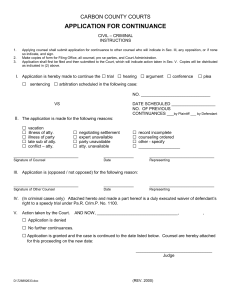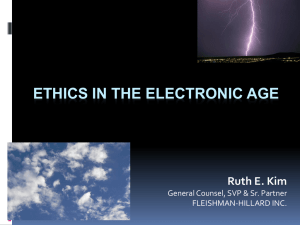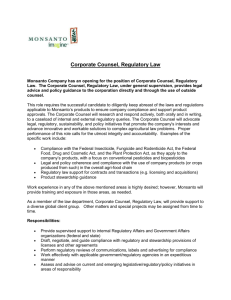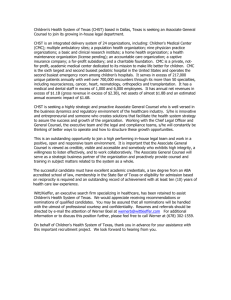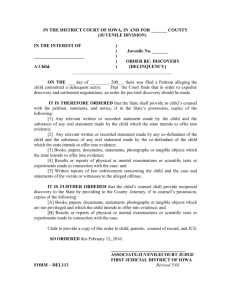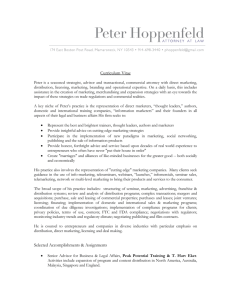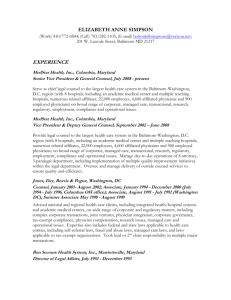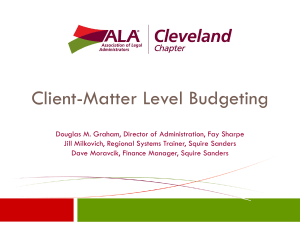doc - Luzerne County Courts
advertisement
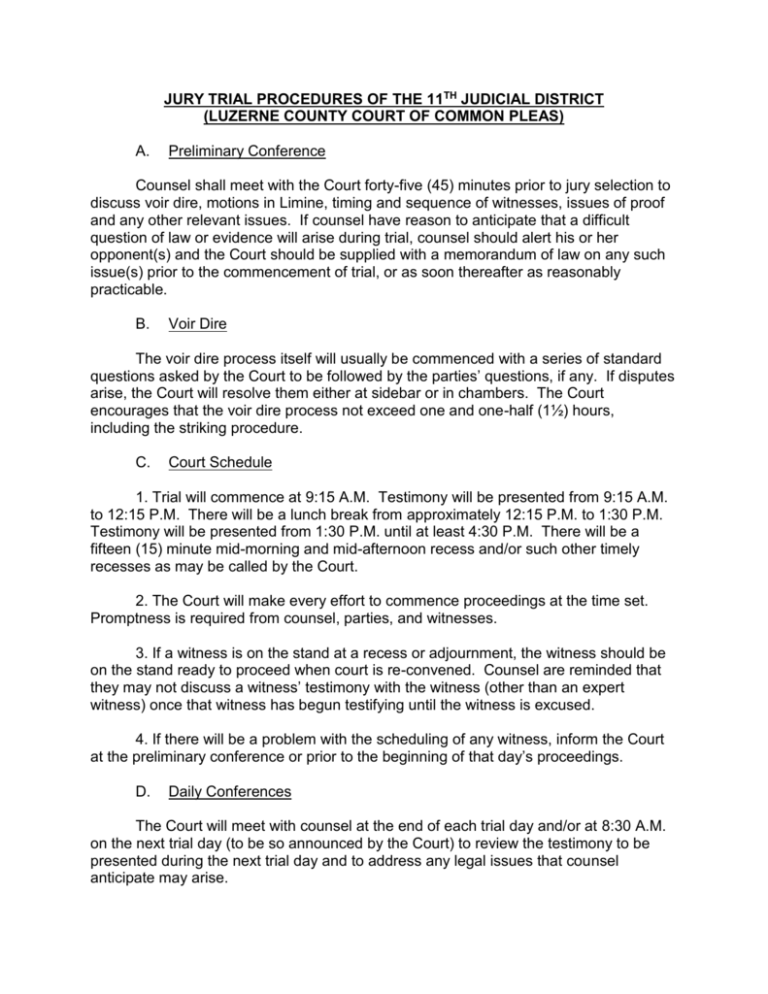
JURY TRIAL PROCEDURES OF THE 11TH JUDICIAL DISTRICT (LUZERNE COUNTY COURT OF COMMON PLEAS) A. Preliminary Conference Counsel shall meet with the Court forty-five (45) minutes prior to jury selection to discuss voir dire, motions in Limine, timing and sequence of witnesses, issues of proof and any other relevant issues. If counsel have reason to anticipate that a difficult question of law or evidence will arise during trial, counsel should alert his or her opponent(s) and the Court should be supplied with a memorandum of law on any such issue(s) prior to the commencement of trial, or as soon thereafter as reasonably practicable. B. Voir Dire The voir dire process itself will usually be commenced with a series of standard questions asked by the Court to be followed by the parties’ questions, if any. If disputes arise, the Court will resolve them either at sidebar or in chambers. The Court encourages that the voir dire process not exceed one and one-half (1½) hours, including the striking procedure. C. Court Schedule 1. Trial will commence at 9:15 A.M. Testimony will be presented from 9:15 A.M. to 12:15 P.M. There will be a lunch break from approximately 12:15 P.M. to 1:30 P.M. Testimony will be presented from 1:30 P.M. until at least 4:30 P.M. There will be a fifteen (15) minute mid-morning and mid-afternoon recess and/or such other timely recesses as may be called by the Court. 2. The Court will make every effort to commence proceedings at the time set. Promptness is required from counsel, parties, and witnesses. 3. If a witness is on the stand at a recess or adjournment, the witness should be on the stand ready to proceed when court is re-convened. Counsel are reminded that they may not discuss a witness’ testimony with the witness (other than an expert witness) once that witness has begun testifying until the witness is excused. 4. If there will be a problem with the scheduling of any witness, inform the Court at the preliminary conference or prior to the beginning of that day’s proceedings. D. Daily Conferences The Court will meet with counsel at the end of each trial day and/or at 8:30 A.M. on the next trial day (to be so announced by the Court) to review the testimony to be presented during the next trial day and to address any legal issues that counsel anticipate may arise. E. Opening Statements 1. The purpose of the opening statement is to succinctly state what counsel (or a pro se litigant) expects the evidence to show. 2. Brief reference to the law will be permitted, but only to the extent that it will aid the jury to understand what counsel expects to prove. 3. Opening statements, without leave of Court, shall not exceed thirty (30) minutes. Absent agreement of counsel, or Court ruling, no exhibits or visual aids will be permitted to be used during opening statements. 4. It is improper to use the opening statement to argue the case. 5. Upon violation of any of these rules, the Court may, sua sponte, interrupt the opening statement and admonish counsel. F. Objections to Questions When objecting, counsel shall state only that he or she is objecting and briefly state the specific legal grounds for the objection. Counsel should not use objections for the purpose of making a speech, recapitulating testimony, or attempting to cue the witness. Argument on an objection will not be heard until permission is given or argument is requested by the Court and will usually be heard at side bar. G. Examination of Witnesses 1. Counsel should conduct examination of witnesses while seated at or standing behind counsel table or at a reasonable distance from the witness stand, unless permission is granted to do otherwise. 2. Counsel shall not initially approach a witness without specific permission. 3. Witnesses shall be treated with fairness, respect and courtesy and consideration. 4. Counsel shall not by facial expression, gestures, or other conduct exhibit any opinion, adverse or favorable, concerning any testimony which is being given by a witness. Counsel shall admonish his or her own client and witnesses similarly to avoid such conduct. H. Decorum 1. The trial shall at all times be conducted in a professional, courteous, expeditious and mutually respectful manner. 2. Witnesses and parties should be instructed to wear proper attire to court. 3. Colloquy between counsel is permitted only to expedite the trial. Argument between counsel will not be permitted. All remarks should be addressed to the Court. Counsel may neither act nor speak disrespectfully to the Court or to opposing counsel, any witness or anyone present in the Courtroom. 4. Counsel shall not exhibit familiarity with the parties, witnesses, jurors, or opposing counsel. The use of first names should be avoided except when addressing one’s own client or a child. During opening statements or closing arguments, no juror should be addressed or identified individually or by name or number. I. Closing Arguments 1. Closing arguments, without leave of Court, shall not exceed sixty (60) minutes. 2. Counsel, in making closing arguments, should be mindful of Rule of Professional Conduct 3.4(c): “A lawyer shall not: when appearing before a tribunal, assert the lawyer’s professional opinion as to the justness of a cause, as to the credibility of a witness, as to the culpability of a civil litigant, …but the lawyer may argue, on the lawyer’s analysis of the evidence, for any position or conclusion with respect to the matters stated herein.” 3. Upon violation of either of the above rules, the Court may, sua sponte, interrupt the closing argument and admonish counsel. J. Miscellaneous 1. Counsel/parties are not permitted to have correspondence faxed to them in care of Chambers without permission. The Court will not accept deliveries on behalf of counsel/parties. Counsel/parties are responsible for all of their documents, exhibits and equipment and shall not store such items in the courtroom except upon prior approval of the Court. During a multi-day trial, the parties will usually be permitted to leave their files and equipment (exclusive of valuables) in the courtroom overnight. 2. The Court Reporter is responsible to the Court. Counsel should not direct instructions to, or make requirements of, the Court Reporter. Counsel should direct their requests to the Court and, if appropriate, the Court will issue instructions to the reporter. 3. During any jury deliberations, counsel shall let the judicial assistant know where they are, or provide a cell phone number to the judicial assistant, and shall be available, with their clients, to return to the Court on five (5) minutes notice. 4. From the time the jury is selected until it is discharged, counsel shall avoid any form of contact with the individual jurors, and shall advise their clients and witnesses to do the same.
